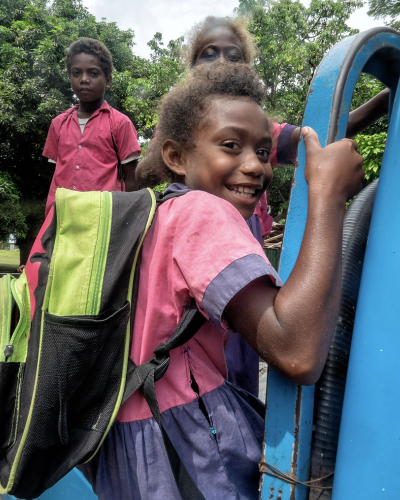Solomon Islands will enhance senior secondary education by focusing on curriculum reform, weather-resilient facilities, and equality for girls in schools. Funded by ADB’s Asian Development Fund and other sources, the project seeks to equip students with the skills needed for sustainable livelihoods and resilience against climate challenges.
Listen to the story
overcoming education challenges in a fragile setting
As a small island developing state in a fragile and affected situation, Solomon Islands faces complex development challenges that hold back its growth and prosperity. Widespread poverty and an outdated education system leave many young people without the skills they need for the future. In 2019, only 13% of children who began primary school finished high school—a stark indicator of the country’s education landscape hurdles.
Gender inequality is a critical concern—just 12% of girls and 14% of boys complete year 12. Harmful gender norms, bullying, and gender-based violence contribute to higher dropout rates among girls. Approximately 44% of girls drop out of school because of pregnancy, influenced by societal norms and school regulations.
Cultural expectations also pressure girls to spend 75% more time on household chores than boys. Job prospects for young people are bleak, with the youth unemployment rate at 35%. More generally, the workforce lacks the right mix of skills to support vulnerable sectors such as agriculture, tourism, and infrastructure. The Year 10-12 curriculum has not been comprehensively updated in 30 years, with an overly high focus on university-required subjects, rather than more practical subjects for those not continuing to university.
Compounding these challenges, the country ranks among the most disaster-prone in the world, second in 2021, with rising sea levels threatening 60% of the population living close to the coast.
a strategic approach to reform
In response to these needs, the Senior Secondary Education Improvement Project in Solomon Islands is laying the groundwork for lasting change. Funded by the Asian Development Bank and the Ireland Trust Fund for Building Climate Change and Disaster Resilience in Small Island Developing States, the project aims to improve quality, relevance, and inclusiveness of education in the country.
Central to the reform is a comprehensive update of the curriculum for Years 10-12, shifting toward practical, employment-focused skills that align with employment opportunities. The project will also train school leaders in disaster preparedness and responsiveness to minimize disruptions in education following disasters.
The project is also building and upgrading facilities in 10 schools, ensuring they are climate-resilient and gender-responsive. Minimum standards for school infrastructure will be modernized to reflect these priorities.
Tackling gender disparities head-on, the project promotes safer, more supportive learning environments for girls. Activities include raising awareness on the prevention of gender-based violence, integrating sexual and reproductive health education, and fostering gender-sensitive teaching practices. A leadership program for aspiring female teachers is also helping pave the way for more women in education leadership roles.
By equipping students with skills for sustainable livelihoods and resilience against climate challenges, the project seeks to contribute to a more inclusive and climate-resilient economy. Emphasizing gender equality ensures equal opportunities for both boys and girls in their educational and career pursuits.
In an important step toward gender equality, the government is developing a national “second chance” policy to support girls who became pregnant, allowing them to continue their studies and return to school. This is expected to be in place by 2029.
promising outcomes
The expected impact of this reform is profound. With a modernized curriculum, graduating high school students will be better prepared for the workforce, equipped with problem-solving and critical thinking skills. Schools will offer safer, more inclusive learning environments that empower girls, giving them better educational opportunities and promoting female leadership in education. Climate-resilient classrooms, with improved drainage, storm protection, ventilation, and cooling, will help minimize the impact of disasters from natural hazards.
Beyond physical improvements, the project will strengthen governance and institutional capacity to ensure Solomon Islands has an education system that is efficient, responsive, and sustainable for the long term.
For the people of Solomon Islands, education reforms are a foundation for opportunity. By equipping young people with the skills they need and creating inclusive, resilient schools, the country is taking bold steps toward a future where every student has the chance to succeed.
“For Solomon Islands, improving education is a critically important part of achieving sustainable, equitable growth. This project will help Solomon Islands transform Year 10-12 curriculums to better equip students with greater job prospects, foster gender equality so girls have a fair chance, and upgrade 10 schools to be climate resilient.”


